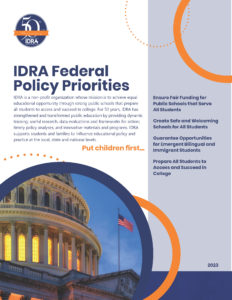IDRA is a non-profit organization whose mission is to achieve equal educational opportunity through strong public schools that prepare all students to access and succeed in college. For 50 years, IDRA has strengthened and transformed public education by providing dynamic training; useful research, data evaluations and frameworks for action; timely policy analyses; and innovative materials and programs. IDRA supports students and families to influence educational policy and practice at the local, state and national levels.
Ensure Fair Funding for Public Schools that Serve All Students
Excellent public schools are needed for all students – not good schools for a few and mediocre ones for the rest.
Unfortunately, many public schools do not receive the funding they need to provide an equitable and excellent education to all students. School finance policies that rely on local property values and unstable state revenue streams to fund schools perpetuate a long history of inequitable access to resources.
The research is clear: educational resources matter, especially for historically under-resourced schools that serve students of color, students from families with limited incomes and emergent bilingual students.
Federal policies should allocate more funding to the programs that help public schools serve systemically-marginalized students, review how states and schools are spending funds to ensure equitable resource allocation and provide incentives to increase equity in state and local school funding plans. Federal policies should not promote school structures or funding schemes that funnel public monies away from our critically-important, yet chronically-underfunded public school systems.
Create Safe and Welcoming Schools for All Students
All students deserve to attend safe and welcoming schools.
However, harmful and discriminatory discipline and policing practices, the failure to enforce basic student protections, inadequate family and community engagement, and the lack of critical personnel and programming create hostile environments where students feel disconnected and unsupported.
Federal lawmakers and agency officials have an important role to play in ensuring safe and welcoming schools for all students, including by passing laws, allocating funding, and issuing clear guidance to states and schools around the following.
- End discriminatory and harmful discipline and policing practices in all schools, including seclusions and restraints, corporal punishment and the use of school-based law enforcement;
- Promote stronger relationships between schools, families and communities;
- Protect students’ civil rights, including by address identity-based bullying;
- Encourage the use of research-based school climate programs;
- Explicitly foster culturally-sustaining instructional pedagogy and practices;
- Require frequent and detailed data reporting, including through the Civil Rights Data Collection; and
- Increase the number of diverse, highly-qualified school-based mental and behavioral health professionals.
Guarantee Opportunities for Emergent Bilingual and Immigrant Students
Emergent bilingual students and immigrant students are a large and growing portion of the student population in many states. They have the amazing capacity to be multilingual, multiliterate, and contribute to the cultural diversity of schools.
Unfortunately, in schools across the country, emergent bilingual students are in inadequate and underfunded language programs that do not rely on best practices for supporting language development in both English and students’ home languages.
Additionally, shortages of certified teachers and poor data collection limit student outcomes and make it difficult to accurately track the success of these students.
Some immigrant students are often excluded from higher education opportunities, including federal financial assistance through Pell grants and work study programs.
Federal policymakers should allocate more money for federal grant programs and agency offices that support emergent bilingual students, including teacher preparation, recruitment, and retention strategies, technology and instructional materials, and meaningful family engagement. Federal financial aid should be extended to all immigrant students to ensure they are able to pursue higher education opportunities.
Prepare All Students to Access and Succeed in College
Schools must prepare all students to access and succeed in college. Yet, too often, schools make pre-college decisions on behalf of students, track them into low-level courses that limit career options, or fail to offer the advanced coursework students need.
Policies and practices that water down graduation requirements and set low achievement expectations perpetuate harmful and discriminatory systems that target students of color, students from families with limited incomes, and first-generation college students.
Financial systems that fail to protect students, regulate tuition and address student debt prevent many well-qualified students from pursuing higher education opportunities.
Federal policymakers should allocate more resources to support college preparation programs like early college high schools, college counseling, and access to advanced coursework for students who are under-represented in higher education.
Contact our IDRA National Director of Policy, Advocacy and Community Engagement, Morgan Craven, J.D., at morgan.craven@idra.org.


